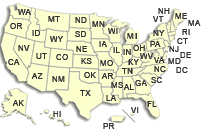Geochemistry of shallow ground water quality coastal plain environments in the southeastern United States: Implications for aquifer susceptibility
Journal Article
By Anthony J. Tesoriero, Timothy B. Spruill, and Jo Leslie Eimers
Full Journal Article (12 pages, 401K)
Abstract
Ground-water chemistry data from coastal plain environments have been examined to determine the geochemical conditions and processes that occur in these areas and assess their implications for aquifer susceptibility. Two distinct geochemical environments were studied to represent a range of conditions: an inner coastal plain setting having more well-drained soils and lower organic carbon (C) content and an outer coastal plain environment that has more poorly drained soils and high organic C content. Higher concentrations of most major ions and dissolved inorganic and organic C in the outer coastal plain setting indicate a greater degree of mineral dissolution and organic matter oxidation. Accordingly, outer coastal plain waters are more reducing than inner coastal plain waters. Low dissolved oxygen (O2) and nitrate (NO3) concentrations and high iron (Fe) concentrations indicate that ferric iron (Fe(III)) is an important electron acceptor in this setting, while dissolved O2 is the most common terminal electron acceptor in the inner coastal plain setting.
The presence of a wide range of redox conditions in the shallow aquifer system examined here underscores the importance of providing a detailed geochemical characterization of ground water when assessing the intrinsic susceptibility of coastal plain settings. The greater prevalence of aerobic conditions in the inner coastal plain setting makes this region more susceptible to contamination by constituents that are more stable under these conditions and is consistent with the significantly (p < 0.05) higher concentrations of NO3 found in this setting. Herbicides and their tansformation products were frequently detected (36% of wells sampled), however concentrations were typically low (< 0.1 ug/L). Shallow water table depths often found in coastal plain settings may result in an increased risk of the detection of pesticides (e.g., alachlor) that degrade rapidly in the unsaturated zone.
Citation:
Tesoriero, A.J., Spruill, T.B., and Eimers, J.L., 2004, Geochemistry of shallow ground water in coastal plain environments in the southeastern United States—Implications for aquifer susceptibility: Applied Geochemistry, v. 19, issue 9, p. 1471-1482.
|
For more information, contact |
To order printed copies |
North Carolina Water Science Center
U.S. Geological Survey
3916 Sunset Ridge Road
Raleigh, North Carolina 27607
(919) 571-4000
E-mail
|
Reprint copies are available from the Journal of Applied Geochemistry (published by Elsevier Ltd.); or online at www.sciencedirect.com. |
|
